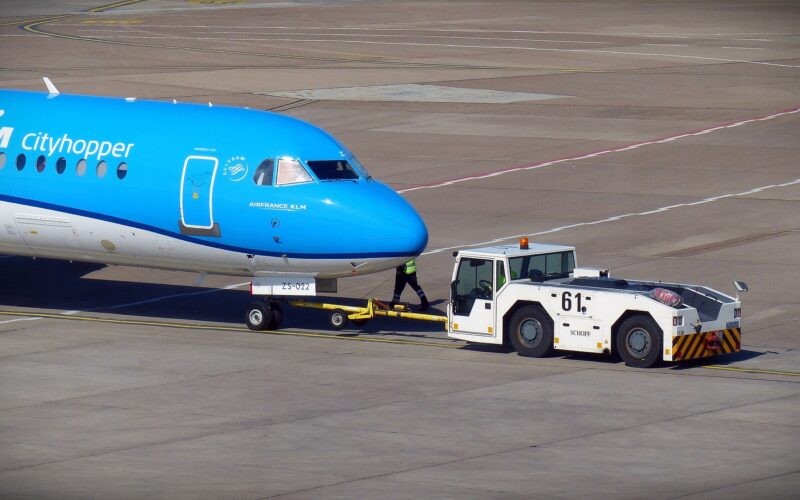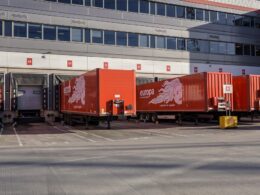- new government-backed transport projects to fuel supermarket delivery trucks and airport vehicles with hydrogen
- the North East will be at the forefront of developing hydrogen tech, with over an £8 million investment into the Tees Valley hydrogen transport hub
- second round of funding set to grow the economy, develop skills and create jobs, while helping to decarbonise transport
Airports and supermarket deliveries could become greener and more efficient thanks to a £8 million government competition to support hydrogen-powered transport in the North East, grow the economy and create jobs.
The Transport Secretary has (2 August 2023) announced 2 winning projects of the second phase of the competition, encouraging more businesses and innovators to develop new technology that uses hydrogen fuel to accelerate transport decarbonisation.
One project led by ULEMCo, receiving a share of the £8 million funding, will develop hydrogen-powered airport ground-based support vehicles, such as tow trucks for aeroplanes and sweepers to clean runways. This will be based at Teesside international airport, which will help the airport reach its goal of being net zero by 2030.
Another of the winning projects led by Element 2 aims to create new hydrogen refuelling stations, helping to provide the infrastructure needed to scale up the use of hydrogen as a fuel. This funding will create 4 new publicly accessible hydrogen refuelling stations, increasing the number of refuelling stations in the UK by 50%. These will be used to fuel a range of vehicles, from airside vehicles to heavy goods vehicles (HGVs), including supermarket delivery trucks.
Today’s announcement also confirms £300,000 delivered directly to colleges in the area to support upskilling the local workforce and foster a specialised skills base and pipeline of talent, further cementing the Tees Valley’s status as the home of hydrogen.
Hydrogen technology has great potential to decarbonise transport and help grow the economy.
Today’s winners illustrate the expertise the Tees Valley has as a pioneer in developing hydrogen tech. This investment will provide a further boost to the economy, creating skilled jobs and apprenticeships across the North East.
Transport Secretary Mark Harper
This funding brings the UK closer to decarbonising some of the heavier and more complex vehicles, such as airside operations, which will be essential in reaching net zero. Already used in buses across the country, hydrogen fuel cells create no harmful exhaust emissions. Greater use of hydrogen could help grow the UK economy with a transport system that is resilient to global energy prices, environmentally friendly and could see the creation of thousands of skilled jobs.
Today’s funding also marks the continued growth of the UK’s only hydrogen transport hub, attracting even more innovation, investment and jobs to the Tees Valley. The competition invited ideas on how to overcome some of the challenges of scaling-up hydrogen technology, such as refuelling on a large scale and making the region’s supply chain greener with hydrogen-fuelled vans and HGVs.
We’re working hard to make Teesside an airport people can be proud of – and that doesn’t just mean flying to the destinations people love. It’s about acting responsibly, for the good of our local people and businesses and the future of our planet.
This hydrogen refuelling station does just that, by proving this new technology is safe and reliable, and can be used across all sorts of applications. This makes it clear Teesside is helping to pioneer both the aviation industry and the clean energy sector.
Phil Forster, Managing Director of Teesside International Airport
This is the second round of government competition funding for the Tees Valley hydrogen transport hub following the first round, which focused on developing hydrogen-powered vehicles.
The first competition saw over £2.6 million awarded to various winners to deploy 21 hydrogen-powered vehicles. One of the winners was Toyota, which provided hydrogen vehicles for local police forces, and Hydrogen Vehicle Systems, which developed a hydrogen-powered van for large supermarkets to deliver largescale groceries.
We were one of the first areas to trial hydrogen fuels and this is continuing to pay off as we’ve been successful in securing this permanent refuelling station.
Our airport and, indeed, our whole region continues to be at the forefront of the UK’s net zero ambitions and this hydrogen station is another step forward to supporting the cleaner, healthier and safer industries of tomorrow. It backs up everything we’re doing in our low-carbon journey, including supporting the production and adoption of sustainable aviation fuel – one of the biggest issues facing the industry right now.
The aim to have Teesside airport operationally net zero by 2030 is only the beginning. We’re still pioneering offshore, carbon capture and renewable technologies over at Teesworks, to truly cement Teesside, Darlington and Hartlepool as the place to do business in innovative and clean technologies.
Tees Valley Mayor Ben Houchen
Since the Hub was launched in 2020, the Tees Valley region has benefited from millions in government funding and private investment. Recent forecasts have estimated that by 2030, the hydrogen sector could support over 12,000 jobs nationally and unlock over £9 billion in private investment.
Today’s announcement of these new projects in the Tees Valley further adds to our significant partnership with DfT to accelerate new technologies to decarbonise transport. This includes nearly £300 million of investment from DfT via Innovate UK in transport decarbonisation across maritime, heavy goods vehicles and hydrogen.
Place-based innovation like this is vital to invigorate local economies like the Tees Valley. These projects are an important investment to decarbonise transport and a boost for local innovation, investment, skills and business growth.
Innovate UK Executive Director for Net Zero, Mike Biddle
Source: GOV.UK













